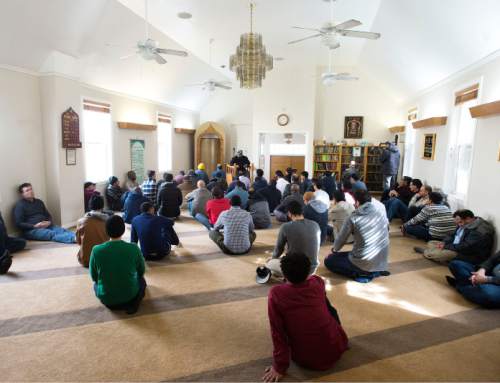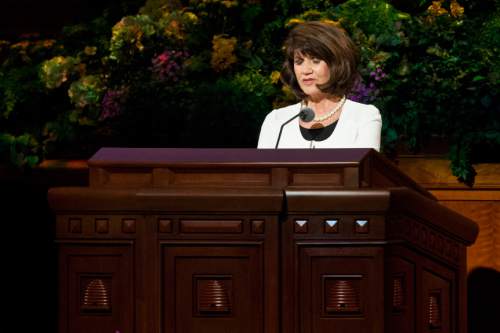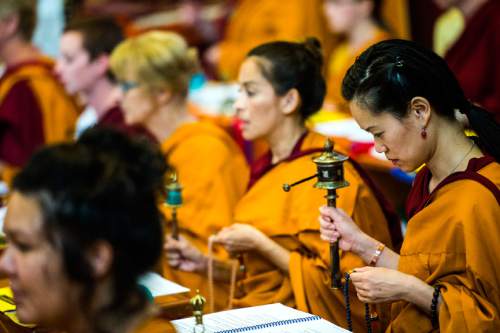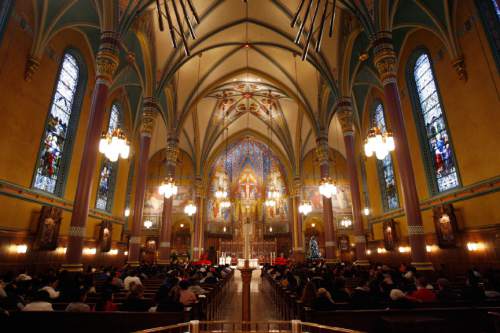This is an archived article that was published on sltrib.com in 2016, and information in the article may be outdated. It is provided only for personal research purposes and may not be reprinted.
Fewer men than women show up in U.S. churches, and women are markedly more likely to pray and to hold up religion as important.
But, in Muslim nations, it's the women who are missing in action at the mosque — and yet they're on par with men in upholding almost all the Islamic pillars of faith.
Those are among the top findings in a new Pew Research study of the gender gap in religion, drawn from data in 192 nations, released Tuesday.
The overall conclusion: Women, particularly Christian, are generally more religious than men worldwide. An estimated 83 percent of women around the world identify with a faith group, compared with 80 percent of men, according to the report.
That's not a conclusion people could reach by observation, say demographer Conrad Hackett and senior writer and editor Caryle Murphy, co-authors of the report.
"If you were a Christian woman in Kansas and you and your husband both go to church," Murphy said, "you might think men and women are equally religious."
That's not so, she said. "We pray more than our male peers, we attend church more and we are more likely to say our religion is important to us."
This same hypothetical American, Murphy said, might also want to know about a Muslim neighbor down the street "who belongs to a faith where men and women are very much alike in their commitment."
The only exception for Muslims, who make up 23 percent of the world population, is that men attend mosque more than women, said Hackett.
In 61 of 192 countries studied, women are more likely than men to claim a religious identity. "There's not always a huge difference," Hackett said, "but when there is a difference, it always favors women."
The nones — people with no self-identified religious affiliation — are more likely to be men: 55 percent to 45 percent for women.
Religiosity lessens among Christian women as they move up the economic ladder.
Valerie M. Hudson, George H. W. Bush Chair in The Bush School of Government & Public Service at Texas A&M University, is not surprised by Pew's results but is intrigued by connections to her own research on women and world peace.
If one of the functions of religion is to provide answers to how to endure amid injustice and affliction, women would naturally be more religious, said Hudson, co-founder of the WomanStats Project. "All over the world, women face higher levels of injustice and affliction than men. For many men, injustice and affliction stop at the doorstep to their home. Whereas, for women, the most likely place for them to experience injustice and affliction is in the home."
Hudson understands why women might be more prayerful.
Young mothers might be more prayerful on behalf of their offspring, Hudson wrote in an email, and elderly women — who frequently outlive their spouses — are often more religious as they try to find meaning in impending death.
A disproportionate share of elderly women, too, "live in poverty, compared to elderly men," she wrote, "and this stage of life for women can become, then, another type of affliction to be relieved by religious devotion."
Overall, however, the Pew report, mapping prayer, affiliation and importance of religion across the globe in deep detail, does not explain why there is a gap between — and within — the genders.
Unanswered questions examined in the report include the age-old argument of whether nature or nurture can account for it, and how much theology, economics and majority or minority status by race or religion make a difference within and between genders.
U.S. Christian women, for example, may become less religious as their own paychecks climb because they get less affirmation from religious congregations that honor women in traditional family-centered roles, said Indiana University sociologist Landon Schnabel, an adviser to Pew Research on this survey.
His research found that high-earning white Christian women (over $100,000 a year in personal income) are no more religious than high-earning men.
Theology may undergird the differences between men and women in Christianity, said Linda Woodhead, professor in the department of politics, philosophy and religion at Lancaster University.
"Christianity is a highly feminized religion: Jesus is not at all macho, unlike Muhammad," said Woodhead, who sees this as "a problem for men" that other major religions do not share.
But as Christian women move out of traditional support roles in the home and in the church and insist on equity in society, the problem will grow for churches that "defend male leadership, the nuclear family and traditional gender roles," she said, looking at her research in the United Kingdom.
She cited "extensive interviews in which I kept coming across women struggling to make sense of how they could be Christian and self-developing individuals. Their daughters didn't struggle, they just gave up a church which no longer spoke to their condition, just like their brothers.
Kecia Ali, an associate professor of religion at Boston University, when told about the Pew findings, observed that "most Muslims hold that attendance at Friday midday communal prayer is obligatory for men but merely encouraged or simply permissible for women."
"But whether women actually go to mosques, vary greatly depending on local norms and those are in flux, For instance, one thing that's shifted in Egypt over the last 30 years of religious revival there is a dramatically increased presence of women in mosques," said Ali, author of "Sexual Ethics and Islam."
The Pew gender gap report was based on examining Christians, Muslims, Buddhists, Hindus, Jews and the unaffiliated (nones) in data from censuses, demographic surveys and population surveys conducted in the past seven years.
Tribune reporter Peggy Fletcher Stack contributed to this story.









